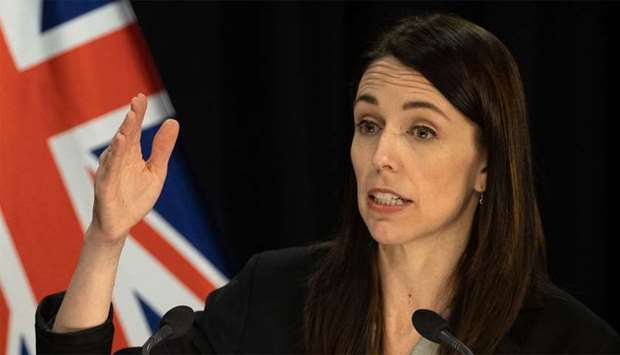New Zealanders must brace for additional Covid-19 cases from an outbreak that has plunged the previously virus-free country into a snap lockdown, Prime Minister Jacinda Ardern warned Wednesday after nine more positive tests.
Ardern confirmed New Zealand was dealing with the highly transmissible Delta variant linked to the outbreak in Australia that authorities have so far been unable to contain.
Ardern said the rapid rise, taking the total number of cases to 10, justified her decision to issue nationwide stay-at-home orders Tuesday when just one case had been identified.
"It demonstrates, at this stage, Level 4 (hard lockdown) is the right place to be," Ardern told TVNZ.
She said one of the new cases was a nurse at Auckland Hospital and another was a teacher at a high school, both representing high-risk environments for rapidly spreading the virus.
"We're expecting more," she said as officials revealed modelling predicted there could already be up to 120 cases in the community linked to the cluster.
The initial infection, a 58-year-old Auckland man, ended a six-month run without local transmission in New Zealand, which has recorded only 26 Covid-19 deaths in a population of five million since the start of the pandemic.
Ardern said investigators were trying to work out how the man caught the strain linked to Australia.
"Our case has originated in Australia, now the job we have is to work through how and when it got here," she said.
"The natural place to start is to look at our managed isolation (border) facilities."
The national lockdown -- New Zealand's first in 15 months -- is scheduled to last three days, with Auckland and the nearby Coromandel area facing restrictions for a week.
- 'Unpredictable and disruptive' -
Ardern said there had been three positive border cases this month from Sydney, where an outbreak continues to rage even though stay-at-home orders have been in place since late June.
Director-General of Health Ashley Bloomfield said there were no obvious links between the border cases from New South Wales -- of which Sydney is the capital -- and the 10-strong cluster in Auckland, four of whom were flatmates in their 20s.
"They've been out and about a lot and I'm flagging there will be large numbers of places of interest," Bloomfield added, saying some of the flatmates had visited a church and Auckland's Sky City casino.
Ardern was confident that even with more cases, her government's strategy of eliminating the virus, rather than just containing it, would succeed.
"Yes, Delta poses a greater threat, but the same tools that have worked before will do so again if we follow the rules," she said.
She said wastewater testing in Auckland had detected no sign of the virus, giving cause for optimism.
Police confirmed four people had been arrested at a small anti-lockdown protest in Auckland, with supporters of high-profile conspiracy theorists Billy Te Kahika saying on his social media platforms that he was among those detained.
"It is disappointing that some choose to put others at risk," Ardern told reporters, saying most people were following the rules.
The Reserve Bank of New Zealand cited the latest lockdown as a reason for keeping its base interest rate at a record low of 0.25 percent.
Analysts had predicted before the outbreak that the central bank would lift rates amid improving economic signs.
"Today's re-introduction of Level 4 restrictions to activity across New Zealand is a stark example of how unpredictable and disruptive the virus is proving to be," it said.

